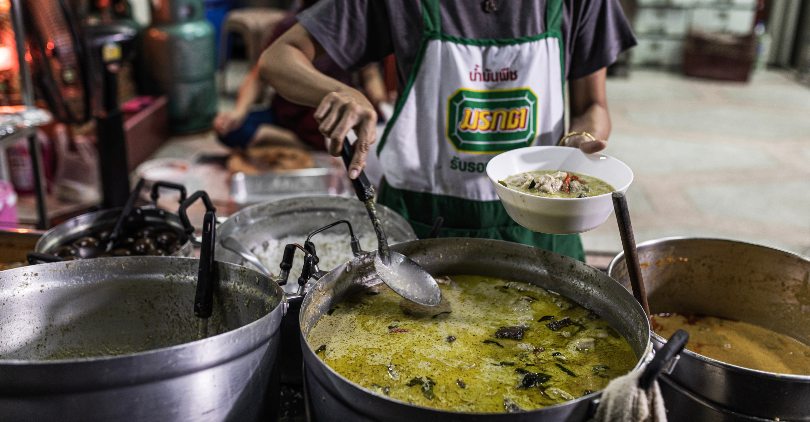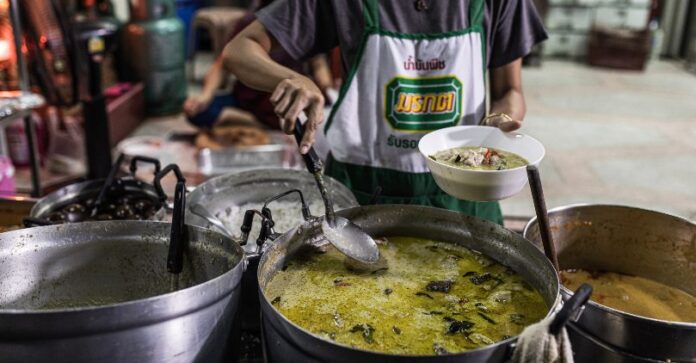Thailand Seizes Opportunity in the Burgeoning Global Halal Food Market
Thailand’s Ministry of Commerce is positioning the kingdom to capture a larger share of the rapidly growing global halal food market, projected to reach $3.1 trillion by 2027. The nation aims to capitalize on what officials describe as a “golden opportunity,” according to The Nation.
The global halal market, once considered a niche, has evolved into a significant domain driven by a large Muslim population and the increasing per capita spending of Muslim consumers worldwide.
UN statistics from 2024 indicate that Muslims comprise 1.907 billion people, equivalent to 23.5% of the world’s total population.
This number is expected to soar to 2.761 billion by 2050, accounting for nearly 30% of the global population, and bringing with it the immense potential of the halal market.
According to Salaam Gateway, a leading Islamic economic research institute, the global halal products market was valued at $2.35 trillion in 2024.
Food and beverages dominate this vast market, accounting for $1.38 trillion – nearly 59% of the total halal market value. Other significant industries include fashion, media and entertainment, tourism, pharmaceuticals, and cosmetics.
By 2027, halal food and beverages alone are expected to reach a value of $1.89 trillion.
Poonpong Naiyanapakorn, Director-General of the Office of Trade Policy and Strategy under the Ministry of Commerce, has underscored Thailand’s strong position in this arena.
In 2024, Thailand’s food exports to the Organization of Islamic Cooperation (OIC) countries reached $7.1313 billion, marking a robust growth of 6.3%.
Poonpong stated, “This consolidates Thailand’s presence in the OIC market and signals a golden opportunity for Thai entrepreneurs to capitalize on the rising global demand for halal products in 2025 and beyond.”
He emphasized that the appeal of halal food is not limited to Muslim consumers due to its adherence to stringent Islamic production principles, ensuring cleanliness and hygiene.

Thailand aims to capture a larger share of the global halal food market. Illustrative image.
This awareness of safety and quality is attracting a broader consumer base, driving continuous growth in demand, especially in OIC countries.
Prime Minister Pham Minh Chinh: Vietnam Prioritizes Halal Industry Development
Globally, exports of halal food and beverages to OIC countries totaled $247.362 billion in 2024, a 6.9% increase from 2023. While the main exporters include Brazil, India, China, Turkey, and the US, Thailand is currently ranked as the 10th largest food exporter to the OIC market.
The top importers of halal food and beverages within the OIC include Indonesia, the United Arab Emirates, Malaysia, Saudi Arabia, and Turkey.
Thailand’s main halal exports include rice, canned tuna, sugar, animal feed, and spices. The country maintains its competitive edge through product quality, food processing capabilities, and a reliable halal certification system.
In late May, during talks in Kuala Lumpur, Prime Minister Pham Minh Chinh and Malaysian Prime Minister Anwar Ibrahim agreed to continue enhancing exchanges, high-level contacts, and engagements at all levels across various channels, according to the Ministry of Foreign Affairs.
Prime Minister Pham Minh Chinh affirmed Vietnam’s readiness to provide a stable and long-term supply of rice to Malaysia and requested Malaysia’s support in developing Vietnam’s halal industry and signing a cooperation document in this field soon. Approximately 65% of Malaysia’s population is Muslim.
Last October, at the first National Halal Conference, Prime Minister Pham Minh Chinh emphasized three key messages regarding Vietnam’s development of the halal industry.
Firstly, Vietnam attaches great importance to cooperation in the halal field and aims to make it an “important content of economic cooperation, a new pillar, and a new driving force” in developing relations with other countries, especially Islamic countries worldwide.
Secondly, Vietnam prioritizes the development of the halal industry, considering it a new orientation in production activities. “We consider halal as a ‘golden opportunity’ for Vietnamese businesses to improve their production capacity, strengthen cooperation with partners, and effectively participate in the halal market and global halal value chain,” the Prime Minister shared.
Thirdly, Vietnam’s approach to developing the halal industry is based on respecting cultural values, especially human culture, reflecting Vietnam’s positive and responsible contribution to building a peaceful, cooperative, diverse, harmonious, and mutually beneficial world.
Unleashing a New Export Market: Tapping into a $2 Trillion Opportunity.
The food industry is set to boom, with an estimated spend of $15 trillion by 2050. However, Vietnam currently has only 20 products in this market. There is a huge opportunity for growth and expansion, and with the right strategy, Vietnam can tap into this lucrative industry and increase its market share.

















